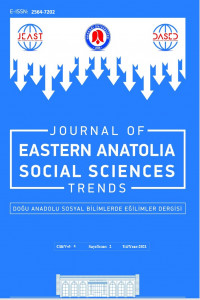Öz
Tufan Ekici’s ‘The Political and Economic History of North Cyprus’ is published in 2019 by Palgrave Macmillan as a part of Studies in Economic History series. It deals with 44-years old north Cyprus government, which emerged after division of the island in 1974. Examining the political organization and structure of the government, labour market, state economic enterprises, and allocation of land, Ekici sheds light on the turbulent history of the political apparatus of north Cyprus. The 283-page book consists of nine chapters, and it is the first book-length analysis on the economic history of that part of the island. The book addresses many significant questions such as the relation between Turkey and the north Cyprus, economic development across the Cyprus, and identity of the possible perpetrators of pre-1974 violent incidents. As explained in more detail in Chap. 2, the territory of the Turkish government in north Cyprus is an artificial construction, came to existence out of one third of the island on the northern coast, where would be Turkified after the division. Turkish government in the north transformed itself into an independent state on November 15, 1983. Nevertheless, it lacks international political recognition, except Turkish Republic, and exists as a de facto state since that day. The negligence of international community is coupled with that of scholarly literature as there are few studies on the economic and political history of the north Cyprus. In that respect, Ekici’s book is an important contribution to Cyprus Studies and Turkey's role in north Cyprus’ economic and political affairs.
Anahtar Kelimeler
Kaynakça
- The Political and Economic History of North Cyprus: A Discordant Polity, by Tufan Ekici, Cham, Switzerland, Palgrave Studies in Economic History, 2019, 326 pp
Öz
Tufan Ekici’s ‘The Political and Economic History of North Cyprus’ is published in 2019 by Palgrave Macmillan as a part of Studies in Economic History series. It deals with 44-years old north Cyprus government, which emerged after division of the island in 1974. Examining the political organization and structure of the government, labour market, state economic enterprises, and allocation of land, Ekici sheds light on the turbulent history of the political apparatus of north Cyprus. The 283-page book consists of nine chapters, and it is the first book-length analysis on the economic history of that part of the island. The book addresses many significant questions such as the relation between Turkey and the north Cyprus, economic development across the Cyprus, and identity of the possible perpetrators of pre-1974 violent incidents. As explained in more detail in Chap. 2, the territory of the Turkish government in north Cyprus is an artificial construction, came to existence out of one third of the island on the northern coast, where would be Turkified after the division. Turkish government in the north transformed itself into an independent state on November 15, 1983. Nevertheless, it lacks international political recognition, except Turkish Republic, and exists as a de facto state since that day. The negligence of international community is coupled with that of scholarly literature as there are few studies on the economic and political history of the north Cyprus. In that respect, Ekici’s book is an important contribution to Cyprus Studies and Turkey's role in north Cyprus’ economic and political affairs.
Anahtar Kelimeler
Kaynakça
- The Political and Economic History of North Cyprus: A Discordant Polity, by Tufan Ekici, Cham, Switzerland, Palgrave Studies in Economic History, 2019, 326 pp
Öz
Tufan Ekici’s ‘The Political and Economic History of North Cyprus’ is published in 2019 by Palgrave Macmillan as a part of Studies in Economic History series. It deals with 44-years old north Cyprus government, which emerged after division of the island in 1974. Examining the political organization and structure of the government, labour market, state economic enterprises, and allocation of land, Ekici sheds light on the turbulent history of the political apparatus of north Cyprus. The 283-page book consists of nine chapters, and it is the first book-length analysis on the economic history of that part of the island. The book addresses many significant questions such as the relation between Turkey and the north Cyprus, economic development across the Cyprus, and identity of the possible perpetrators of pre-1974 violent incidents. As explained in more detail in Chap. 2, the territory of the Turkish government in north Cyprus is an artificial construction, came to existence out of one third of the island on the northern coast, where would be Turkified after the division. Turkish government in the north transformed itself into an independent state on November 15, 1983. Nevertheless, it lacks international political recognition, except Turkish Republic, and exists as a de facto state since that day. The negligence of international community is coupled with that of scholarly literature as there are few studies on the economic and political history of the north Cyprus. In that respect, Ekici’s book is an important contribution to Cyprus Studies and Turkey's role in north Cyprus’ economic and political affairs.
Anahtar Kelimeler
Kaynakça
- The Political and Economic History of North Cyprus: A Discordant Polity, by Tufan Ekici, Cham, Switzerland, Palgrave Studies in Economic History, 2019, 326 pp
Ayrıntılar
| Birincil Dil | İngilizce |
|---|---|
| Bölüm | DASED |
| Yazarlar | |
| Yayımlanma Tarihi | 26 Aralık 2021 |
| Gönderilme Tarihi | 21 Ağustos 2021 |
| Yayımlandığı Sayı | Yıl 2021 Cilt: 5 Sayı: 2 |


